- Home
- Mind & body
- The top 10 nutrition tips, backed by science!
At CBHS we help you manage your health challenges. We believe in offering you the services, support and tools you need to live your best life.
Health and Wellness Programs are available to support eligible members towards a healthier lifestyle. Each Health and Wellness Program is subject to its own eligibility criteria.
Contact us for more information and to confirm your eligibility for a program.
The top 10 nutrition tips, backed by science!

Cut out carbs, go on a juice fast, pick Paleo, be a pescatarian... There’s a lot of dietary noise out there! That’s why, when it comes to eating healthy and feeling the benefits, it can be difficult to know the best path to optimum nutrition and good health.
To help ease some of the conflicting information we’re being fed (!) every day, we’ve put together a user-friendly guide to the dos and don’ts of good nutrition. You probably already know a lot of the tips here and it may feel like common sense – but this information isn’t random or in any way related to a fad or the latest celebrity diet. In fact, combined with regular exercise, good quality, consistent sleep and rest, these top 10 nutrition tips can help keep your health on-track!
1. Choose the good carbs
There’s a big misconception that carbohydrates are bad for you. But before removing them from your diet, stop and think about the kind of carbs you eat. They’re actually a necessary nutrient that fuels our bodies.
Simple carbohydrates
The more ‘simple’ a carb is, the quicker you absorb the sugar that’s inside it. However, if the carb contains too much of this sugar, it’ll be harder to burn off and your body will likely store it as fat.
‘Simple’ carbs can include:
- White rice
- White bread
- Pasta
- Noodles.
The ‘simple’ sugars found in these foods offer little to no nutritional value which means there’s nothing to slow down the sugar absorption.
Complex carbohydrates
These carbs contain sugars with plenty of chemical bonds between them making them a lot more complex for your body to digest. This means it takes more time, allowing you to benefit from a slow and steady and sustained level of energy
which you’re likely to use up instead of store as fat.
Complex carbs can include:
- Brown rice
- Quinoa
- Wholemeal bread
- Pulses.
These complex-rich carbs also contain fibre, protein, Vitamin E and antioxidants so they have incredibly potent health effects!
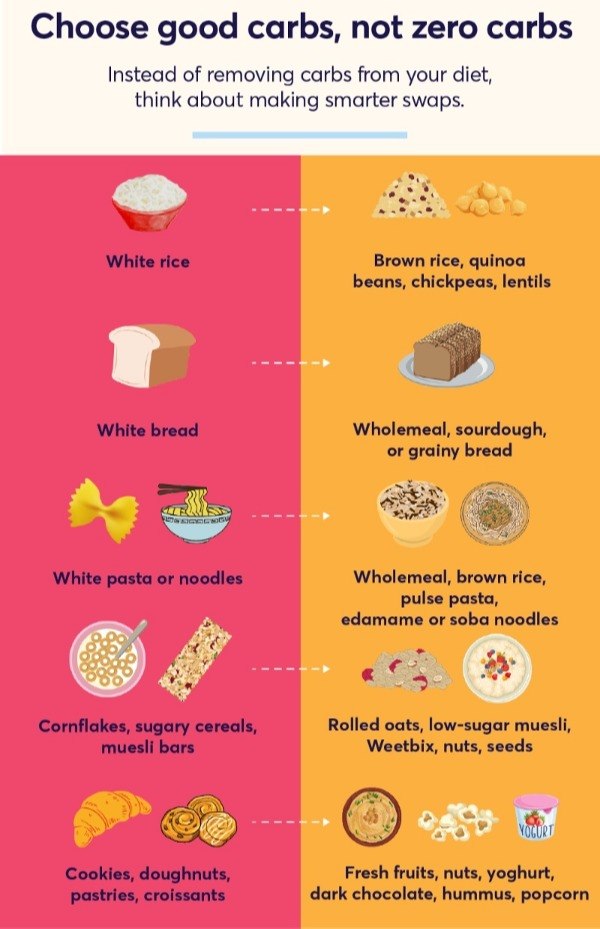
2. Power up with healthy protein
Did you know that good quality sources of protein can help with our moods, sleep, focus, memory, learning and even longevity? Protein also feeds and maintains our muscles. It’s also very complex to digest which means you stay fuller for longer.
Poor quality proteins are usually highly processed which means they contain carcinogenic additives like nitrates and nitrites which give them their ‘pinkish’ colour. These can include:
- Sausages
- Ham and bacon
- Deli and canned meats.
What’s more, the way these meats are processed makes them full of saturated and trans fats which can be harmful for your heart health. The Australian Heart Foundation recommends that we should eat no more than 350g of unprocessed red meat each week.
Good quality protein is low in fat and minimally processed such as:
- Chicken
- Turkey
- Fish
- Plant proteins
- Dairy
- Eggs
- Grains.
Tofu is also a good source of protein and antioxidants however it’s still processed so try not to eat it more than twice a week.
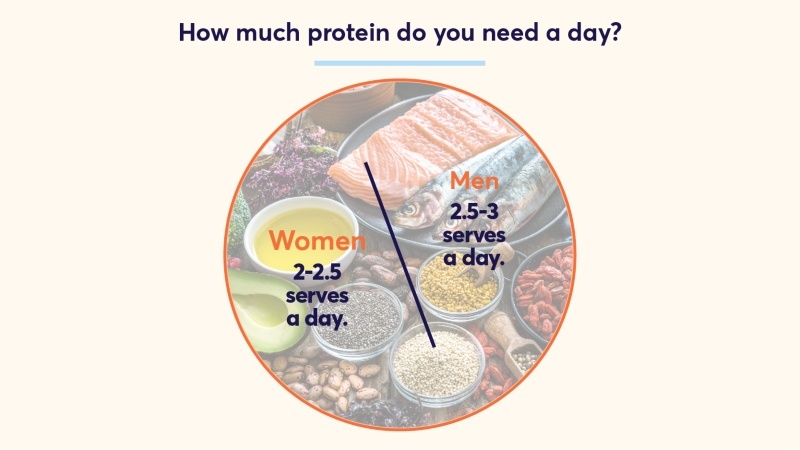
Bear in mind that a serve can fit in the palm of your hand and their size can increase if you’re exercising regularly.
3. Minimise added sugar
Naturally occurring sugars found in fruits and vegetables are perfectly normal. However, the Australian and New Zealand Dietary guidelines recommend that we should limit our intake of foods and drinks that contain added sugars:
- Confectionary
- Sugar-sweetened soft drinks and cordials
- Fruit drinks
- Vitamin waters
- Energy and sports drinks.
What’s more, when it comes to added sugar, the World Health Organisation (WHO) recommends that we should keep our daily intake below 50g (12 teaspoons) in order to prevent unhealthy weight gain or dental caries.
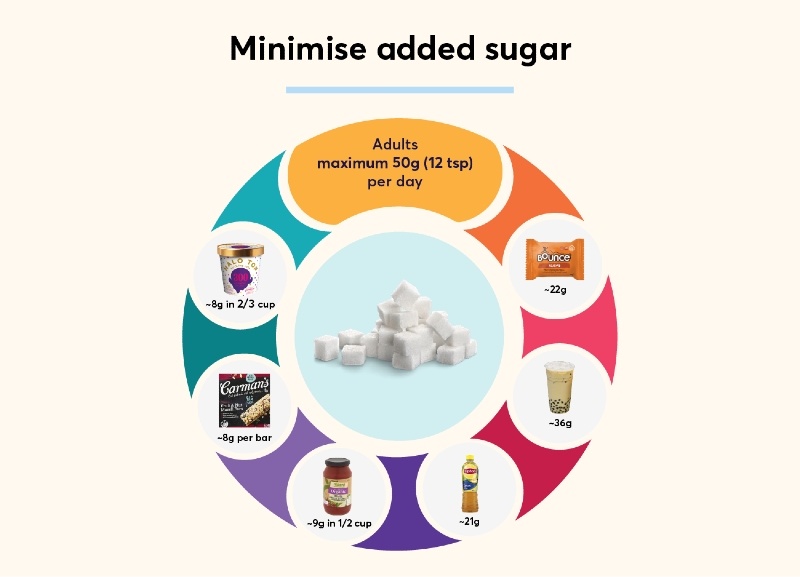
So, when you’re in the snack food aisle at the supermarket, always check the label ingredients!
Look at the 100g section and aim for no more than 15g of sugar per 100g. A few grams here and there may not seem like much, but they add up. Ultimately, sugar isn’t ‘bad’ for you, but it’s all about moderation. Even small amounts
are converted and stored in your body as fat.
“Carbohydrates are a necessary nutrient that fuels our bodies.”
4. Enjoy the good fats
Just like sugar, fat will also add up, particularly saturated fat which shouldn’t make up any more than 10% of your daily calorie intake. Remember, we still need saturated fat, just not in excess because that’s when we gain weight, put pressure on our organs and increase the risk for heart disease and some cancers.
So, try to be a little more conscious of your fat choices: swap to olive oil and lean or white meats, avoid processed fats like mayonnaise, and choose skinny milk in your latte every now and then.
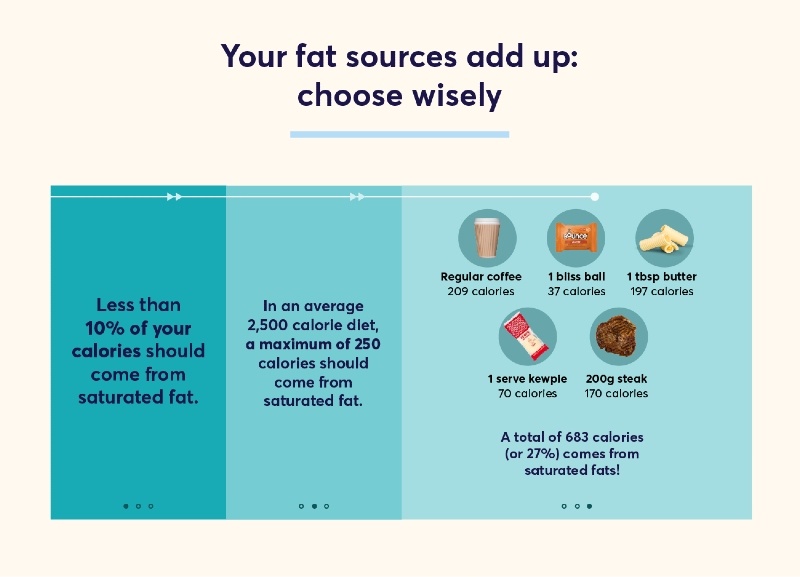
5. Keep coffee to a minimum
Generally, people drink caffeine when they’re feeling fatigued but this can be the beginning of an unhealthy cycle: you knock back an espresso or energy drink, the caffeine content dehydrates you and then you feel more fatigued. Once again, it’s about moderation because coffee actually contains great antioxidants – just don’t over-indulge.
- The limit for caffeine is 400mg or 200mg a day
- Avoid a double shot coffee (which can amount to 300mg)
- Don’t drink caffeine after 12pm.
Caffeine has a half-life of seven hours which means only half the caffeine in your system will be metabolised in seven hours. Science has yet to figure out how long the other half will take to metabolise so the caffeine will still be pumping through your body hours after you’ve had your first sip!
The result? Sleep issues, difficulty focusing and you may even build up a tolerance so that you’ll need more caffeine for more stimulation: that’s when addiction pathways are created in your brain and you become hooked.
6. Stay hydrated
That simple tip of drinking eight glasses of water a day has more wisdom in it than we think. Even mild dehydration will affect your focus and short-term memory. A lack of water can also reduce your blood pressure leaving you feeling light-headed or dizzy.
Having even 2% less hydration in your body, after you’ve used the bathroom for instance, can result in lethargy and make you feel less motivated to tackle physical tasks. But here’s the good news… these effects are easily reversed by drinking more water!
When you’re tired, your body will signal an alert for energy-snacks or stimulants to help wake you up. But really what it’s asking for is – water. In fact, as soon as you’re thirsty, you’re already dehydrated. What’s more, when you get that hunger cue, have some water. You may find you’re not hungry.
Top tip:
You need 35mL of water for every kilo you weigh. So, if you’re 60 kilos, you should be drinking 2.1 litres of water a day.
- Keep a bottle of water handy and sip often
- Be aware of when water leaves your body eg. sweating, using the toilet.
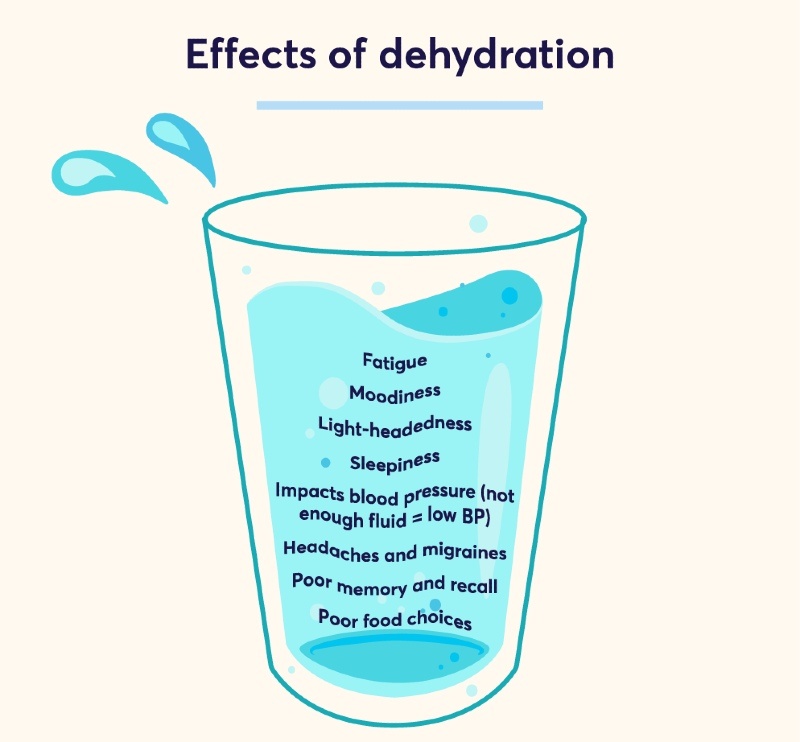
“Next time you get that snack craving, reach for a glass of water. You may just be a little deyhydrated and not hungry at all!”
7. Prepare for hunger: don’t just respond to it
We’ve all been there: as soon as those hunger pangs hit, you reach for the fast food or a sugary, fatty snack to feel full, fast. The problem with being ‘reactive’ as opposed to ‘proactive when you’re starving is, your hunger hormone will eventually lead you to make poor food choices. But here’s how you can control your hunger – and not the other way around!
- Prepare your meals in advance
- Keep your pantry and fridge well-stocked with quality, filling snacks
- Stay hydrated! Often when that hunger attacks, you may just be thirsty.
Need inspiration for healthy meals and snacks?
- Dips
- Chopped veggies
- Snack tomatoes
- Canned tuna
- Crackers
- Roasted chickpeas
- Popcorn.
8. Avoid ultra-processed foods
All foods go through some form of processing. For instance, take a humble grain of wheat: it’s unprocessed when completely intact. But it still needs to go through milling which is a minor form of processing. Then it’s baked into bread before it’s eventually sliced and toasted.
While bread is considered processed food, there are levels that we need to think about when choosing our food. For example, a slice of bread doesn’t have the same level of processing as chicken nuggets or fish cakes that often come from several sources of meat and include preservatives, flavor enhancers and colours. Heavily processed foods are only good for giving you a big dose of energy which you probably won’t be able to use up – so it will be stored as fat.
Other processed foods include:
- Crackers
- Frozen chips
- Muffins
- Cereals
- Protein shakes and bars.
To keep the nutritional content of your diet high, try and replace the processed food in your house with the wholefood versions instead. For instance, roast your own potatoes instead of buying the frozen variety. And substitute that protein bar with a handful of nuts, seeds and dried fruit.
Of course, processed food will always have a place in the modern diet,
but if you can make the time to invest in more wholefoods, your body will thank you!
9. Feed your gut
Probiotics are live bacteria that are naturally found in our gut and in some foods. They improve our health by reducing the number of harmful bacteria that may survive in our gut. So, eating a variety of fermented, probiotic-rich foods like yoghurt can help us cultivate a variety of helpful gut bugs.
“Did you know your gut contains more bacteria than your body has cells? This means we’re more bacterial DNA than our own DNA!”
Large colonies of ‘bugs’ live in your gut including, good bacteria, bad bacteria, yeast, fungi, and viruses. They’re constantly battling one another and looking for opportunities to dominate. If a virus wins, or yeast, or fungi, you become ill. If you’re particularly stressed, you destroy a lot of your good bacteria and give these other colonies an opportunity to take over – which is why you often get sick after a bout of stress.
Probiotics help put the good bacteria back in your gut. Try these fermented foods that contain live bacteria:
- Yoghurt
- Kefir
- Kimchi
- Pickled vegetables.
Probiotics can support your digestive health and immune system.
10. Eat your vegetables!
Vegetables are directly associated with weight management, decreased cholesterol, a lower risk of diabetes, heart disease and even mood-boosters. A good dose of veggies every day can even help improve your sleep and decrease your risk of certain cancers.
However, it’s true that some vegetables don’t taste great, so here are some inventive ways to sneak them into your diet:
- Make a smoothie or spaghetti sauce with cauliflower, spinach and beetroot – you won’t taste a single healthy thing!
- Pop your favourite veggies on skewers and serve with a peanut sauce.
- Roast potato, carrot and onion as a side for your steak.
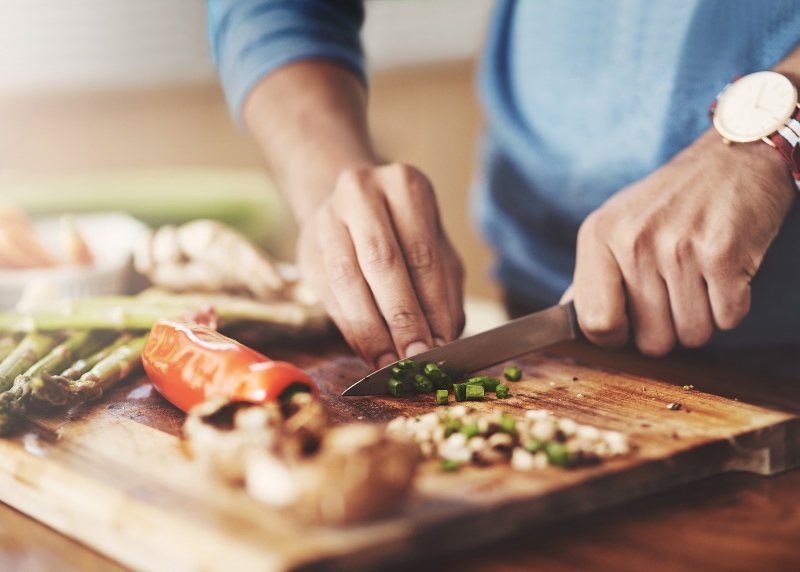
“A diet rich in probiotics like yoghurt and pickled vegetables can put the good bacteria back in your gut and ward off disease.”
Good old-fashioned nutrition trumps the fad diets every time
Eating healthy doesn’t need to be complicated. Fill your meals with plenty of fruits and vegetables, good protein and fats and you’ll feel fuller for longer – and enjoy positive health benefits. Of course, this isn’t about depriving yourself. If you feel like the fries, have the fries! If you’re craving a latte, enjoy it. And if you must have chocolate, choose the dark variety.
The point is to honour your cravings in moderation. Just remember to wash it all down with lots of water. For more nutritional tips and healthy recipes the whole family will love, visit our Nutrition section.
All information contained in this article is intended for general information purposes only. The information provided should not be relied upon as medical advice and does not supersede or replace a consultation with a suitably qualified healthcare professional.
Sources:
https://www.cbhs.com.au/mind-and-body/blog/curb-your-cravings-how-to-resist-those-snack-temptations
https://health.gov/sites/default/files/2019-10/DGA_Cut-Down-On-Saturated-Fats.pdf
https://www.heartfoundation.org.au/heart-health-education/fats-oils-and-heart-health
https://dietitianconnection.com/news/prebiotics-what-are-they-and-do-we-need-them/
https://www.cbhs.com.au/mind-and-body/blog/all-about-sleep-the-good-the-bad-and-the-sleepy
https://www.cbhs.com.au/mind-and-body/blog/embracing-the-natural-flow-of-life-with-meditation
https://www.cbhs.com.au/mind-and-body/blog/healthier-takeaway-options-what-to-eat-on-the-go
Health and wellbeing
programs & support
You Belong to More with CBHS Hospital cover:
- Greater choice over your health options including who treats you
- Get care at home with Hospital Substitute Treatment program
- Free health and wellbeing programs to support your health challenges
Live your healthiest, happiest life with CBHS Extras cover:
- Benefits for proactive health checks e.g. bone density tests, eye screenings
- Keep up your care with telehealth and digital options
- Save on dental and optical with CBHS Choice Network providers
